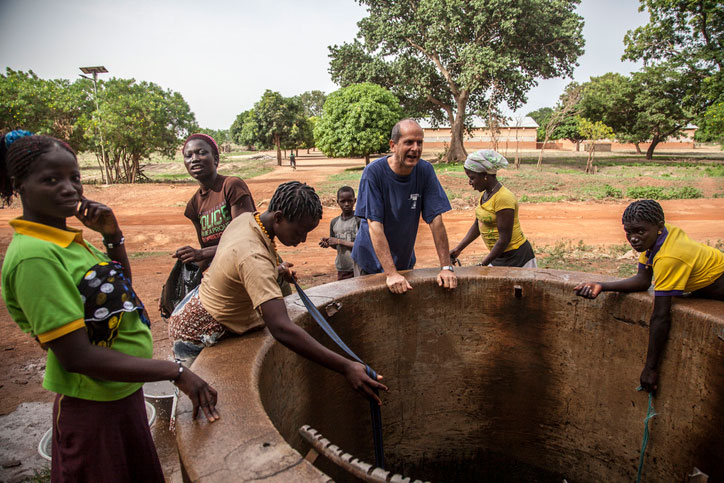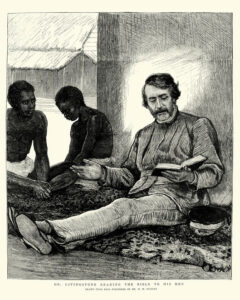
Christianity is on the march, and international pastors and missionaries are leading the way, evangelizing the good word of Christ, and spreading the Lord’s light and peace across the earth.
Globalization, power politics, culture, and conflict zones are just a few of the issues you’re tasked with navigating in this field. This is a tough, challenging, and exciting job that’s not for everyone. When you’re doing international ministry and missions work you wear many hats.
One minute you might be teaching stories from the Bible, and the next you might be mediating peace in a conflict zone. One minute you might be learning the local language, and the next you might be treating the sick and wounded.
Explore a Christian Ministry Degree – Request More Info Today!
While it might seem like people in our communities are becoming less religious by the day, taking a step back and looking at things from a global context reveals the opposite. Over the past century the number of Christians in the world has actually skyrocketed from 600 million a hundred years ago to around 2.5 billion today, making it the world’s largest religion by population.
This is in large part thanks to the hard work and dedication of international pastors and missionaries.
Who Are the Pastors Serving International Missions?
Missionaries and international pastors are people who travel to spread Christ’s love. This often involves sharing the Bible and talking about Jesus with their hosts, but this isn’t a requirement. They can share the Lord’s light by deed only, traveling to do things like construct houses, operate medical clinics, and dig wells.
However, it’s often a main goal of international pastors and missionaries to bring people into the kingdom of Jesus. This means connecting with people in their local culture, addressing their local issues, and speaking their local language.
Jesus spoke in parables, and it’s often metaphors that work best for bridging cultural and language gaps. Pastors and international missionaries are adept at finding inroads for Christian metaphors.
“Doctor Livingstone, I Presume?”
 David Livingstone was a pioneer of Christian ministry, abolitionist, and doctor born in Scotland during the Industrial Revolution to parents living in a cotton factory tenement building.
David Livingstone was a pioneer of Christian ministry, abolitionist, and doctor born in Scotland during the Industrial Revolution to parents living in a cotton factory tenement building.
He was a person of many talents, and an outspoken opponent of slavery in the 19th century. As a young man he was inspired by the idea of being a missionary to spread God’s word. He wanted to go to China, but war stood in his way and instead, after being enthralled by stories of a land with thousands of villages that had never heard the name of Jesus Christ, he set his sights on Africa.
He traveled extensively throughout Southern and Central Africa, learning local languages, crossing a desert, and was the first European to see Victoria Falls.
Soon after he returned to Britain, Livingstone became one of the loudest voices for the abolition of the African slave trade, and published his journals in what is a must-read for any international evangelical: Missionary Travels.
He would return to Africa for many more explorations, adventures, and missionary work. Known as “Africa’s Greatest Missionary,” during the last six years of his life he completely lost touch with his former world and was immersed in the local African region where he was engaged in missionary activity.
It was during this time that a New York City newspaper reporter found him in the oldest town in Tanzania and exclaimed, “Doctor Livingstone, I presume,” an apocryphal quote, perhaps, but one that’s stood the test of time, nonetheless.
Remembered for his missionary work in Africa, Livingstone is also regarded for the respect he gave and garnered from his African hosts.
Even the Most Basic Job Description for International Ministry and Missions Work Involves a Diverse Array of Skills
“Wanted: flexible open-minded people who are passionate about God.”
This is perhaps the best way to write a job description for an international pastor or missionary. There’s no typical day in this line of duty. You need to be flexible, adapt and take things as they come, and find creative ways to communicate the good news of the Lord that transcend culture and language.
Your job duties may be shared by all of the following professions. You need to get creative and find out how to combine being an evangelist and missionary with any of the following:
- Diplomat and conflict resolver
- First aid and medical technician
- Anthropologist and student of culture
- Cultural ambassador of both Christ and your country
- Foreign foodie and cook
- Construction and relief worker
- Teacher
- Linguist
- Logistics coordinator
- Mechanic
Medical skills can be particularly helpful, especially if you’re traveling to a part of the world where the healthcare system is lacking. In general, you’ll find that any tangible skills you have can be useful.
But the most important job requirement, underlying everything else, is this: you must be passionate about God’s mercy and love, and sharing these with others in your own unique way.
A Career in International Ministry and Missionary Work
Once you’re passionate about sharing Christ with others then you’re ready to become a missionary.
Of course, if you’re bringing a skill with you –if you’re a nurse, teacher, mechanic, cook, or construction worker– then you’ll be in even higher demand, but this is more supplemental than a requirement; you really just need to be passionate about Jesus.
While everyone can be passionate about the Lord, there’s an important difference between those with formal education and training in Christianity and the average Sunday churchgoer.
Leadership roles in international ministry and missionary work require responsibility and an in-depth knowledge of scripture. Just as importantly, you will need to develop pastoral skills to help you reach the people you encounter with your message of hope and salvation, offering counsel and clear answers to the questions they are sure to have. That's exactly why a bachelor’s degree is almost always the minimum requirement to be chosen by your church to participate in international outreach and missionary programs.
Relevant bachelor’s degrees for this type of work include those in:
- Christian leadership and ministries
- Family and youth ministry
- Religious studies
- Pastoral ministries
- Mission leadership
Fortunately, you can find Christian bachelor’s degree programs out there that are tailored specifically to ministry, and even some that focus on missions in particular.
And the same holds true for Christian master’s degrees. These programs prepare the leaders of church mission trips to take on senior roles with the highest levels of responsibility. This is important because a well-coordinated and organized mission trip can literally make the difference in the hearts, minds, souls, and lives of both missionaries and their hosts.
Master of Divinity (MDiv) and similar Christian master's programs can be found online and on-campus, both as stand-along programs and with the option to select a focus in areas that include:
- Bible studies
- Christian world mission
- Ministry and missions
- Pastoral care and chaplaincy
- Christian theology
- Christian counseling
In 1910 two-thirds of all Christians lived in Europe. Today just over a quarter of the world’s Christians are in Europe. Thanks to the dedicated work of international pastors and missionaries, the spread of Christianity has made strides:
- In Asia one-in-eight persons is a Christian
- The Americas are home to over a third of all Christians
- Sub-Saharan Africa comprises almost one quarter of all Christians
The Bible Speaks to People of All Cultures, and Sometimes in Unexpected Ways
 For Don Richardson and his wife Carol, it was a long way from North America to Indonesia, but they felt compelled to spread the message of Christ in a faraway land.
For Don Richardson and his wife Carol, it was a long way from North America to Indonesia, but they felt compelled to spread the message of Christ in a faraway land.
As a recently married couple they moved to Papua with their young baby to spread Jesus’ word among a remote tribe that practiced cannibalism and head hunting.
Don studied the local language until he was able to speak and translate the Bible. He also made inroads with the tribe by bringing them metal tools. Combined with his wife Carol’s nursing skills, together they were befriended by their local hosts.
War was common among the tribes of the area, and at one point the Richardsons were close to despair, considering giving up and going home. It was at this point that Don told the story of Judas, the betrayer of Jesus. He found his hosts could relate to this story in a particularly profound way since it was common for their neighboring enemies to engage in clever deception.
The only way a tribe would trust another was if they could hold the son of their opposing tribe’s chief hostage. And so during times of peace, warring tribes would agree to exchange the sons of their respective chiefs.
Realizing the metaphor, Don explained that Jesus was God’s son, and that by accepting Jesus into their hearts the tribes could all have peace.
After hearing this message, the tribes of the area accepted Jesus, made peace with each other, and converted to Christianity. The tribes built a church and forgot their old ways of fighting. Life expectancy increased and the younger generations looked towards the future with hope.









